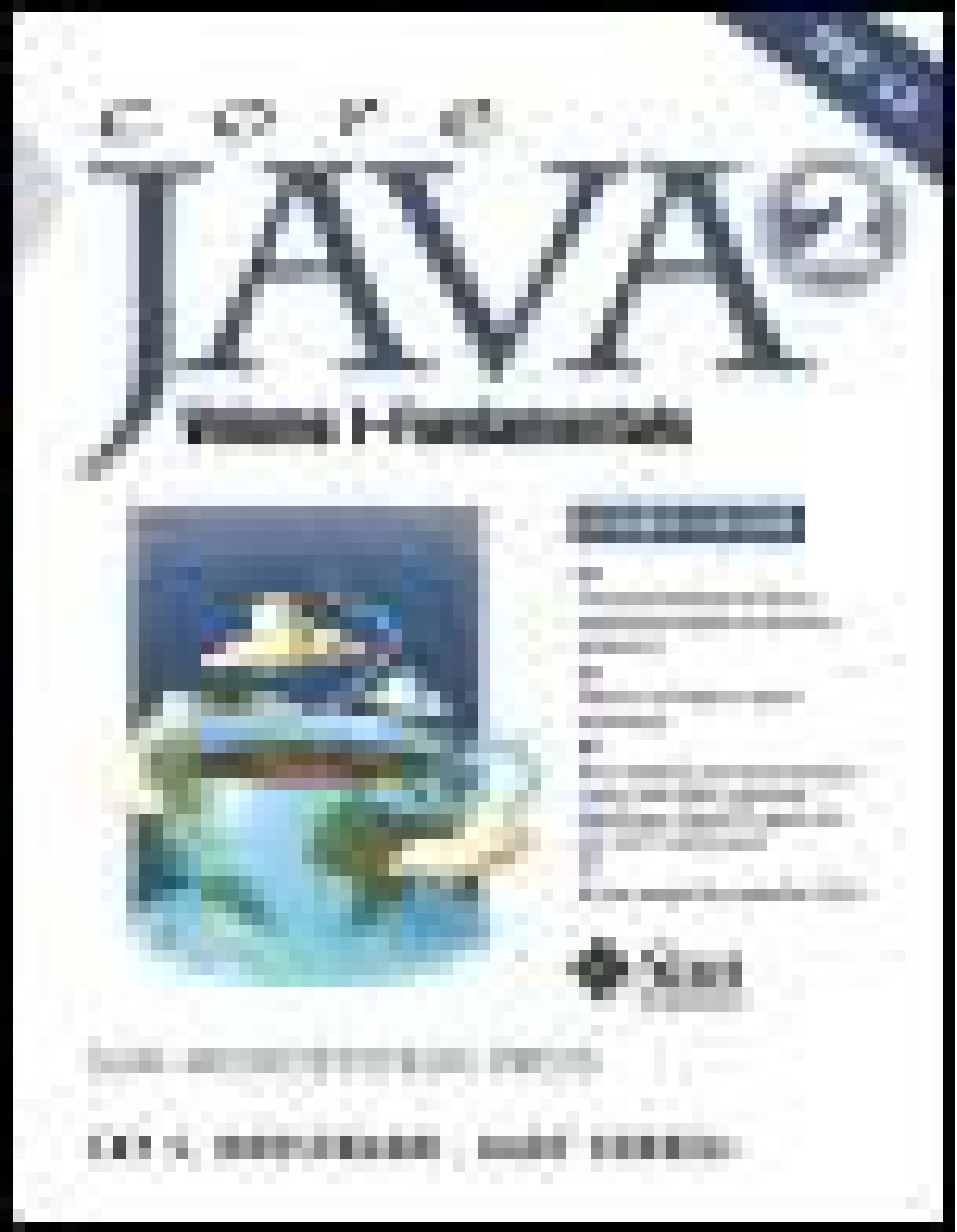Thư viện tri thức trực tuyến
Kho tài liệu với 50,000+ tài liệu học thuật
© 2023 Siêu thị PDF - Kho tài liệu học thuật hàng đầu Việt Nam

Tài liệu đang bị lỗi
File tài liệu này hiện đang bị hỏng, chúng tôi đang cố gắng khắc phục.
Core java pot
Nội dung xem thử
Mô tả chi tiết
Table of Contents
List of Code Examples
Preface
To the Reader
About This Book
Conventions
Sample Code
Acknowledgments
Chapter 1. An Introduction to
Java
Java as a Programming
Platform
The Java "White Paper"
Buzzwords
Java and the Internet
A Short History of Java
Common Misconceptions
About Java
Chapter 2. The Java
Programming Environment
Installing the Java Development
Kit
Choosing a Development
Environment
Using the Command-Line Tools
Using an Integrated
Development Environment
Compiling and Running
Programs from a Text Editor
Running a Graphical
Application
Building and Running Applets
Chapter 3. Fundamental
Programming Structures in Java
A Simple Java Program
Comments
Data Types
Variables
Operators
Strings
Input and Output
Control Flow
Big Numbers
Arrays
Chapter 4. Objects and Classes
Introduction to Object-Oriented
Programming
Using Predefined Classes
Defining Your Own Classes
Static Fields and Methods
Method Parameters
Object Construction
Packages
Documentation Comments
Class Design Hints
Chapter 5. Inheritance
Classes, Superclasses, and
Subclasses
Object: The Cosmic Superclass
Generic Array Lists
Object Wrappers and
Autoboxing
Reflection
Enumeration Classes
Design Hints for Inheritance
Chapter 6. Interfaces and Inner
Classes
Interfaces
Object Cloning
Interfaces and Callbacks
Inner Classes
Proxies
Chapter 7. Graphics
Programming
Introducing Swing
Creating a Frame
Positioning a Frame
Displaying Information in a
Panel
Working with 2D Shapes
Using Color
Using Special Fonts for Text
Doing More with Images
Chapter 8. Event Handling
Basics of Event Handling
The AWT Event Hierarchy
Semantic and Low-Level Events
in the AWT
Low-Level Event Types
Actions
Multicasting
Implementing Event Sources
Chapter 9. User Interface
Components with Swing
The Model-View-Controller
Design Pattern
Introduction to Layout
Management
Text Input
Choice Components
Menus
Sophisticated Layout
Management
Dialog Boxes
Chapter 10. Deploying Applets
and Applications
Applet Basics
The Applet HTML Tags and
Attributes
Multimedia
The Applet Context
JAR Files
Application Packaging
Java Web Start
Storage of Application
Preferences
Chapter 11. Exceptions and
Debugging
Dealing with Errors
Catching Exceptions
Tips for Using Exceptions
Logging
Using Assertions
Debugging Techniques
Using a Debugger
Chapter 12. Streams and Files
Streams
The Complete Stream Zoo
ZIP File Streams
Use of Streams
Object Streams
File Management
New I/O
Regular Expressions
Chapter 13. Generic
Programming
Why Generic Programming?
Definition of a Simple Generic
Class
Generic Methods
Bounds for Type Variables
Generic Code and the Virtual
Machine
Restrictions and Limitations
Inheritance Rules for Generic
Types
Wildcard Types
Reflection and Generics
Appendix A. Java Keywords
Appendix B. Retrofitting JDK
5.0 Code
Enhanced for Loop
Generic Array Lists
Autoboxing
Variable Parameter Lists
Covariant Return Types
Static Import
Console Input
Formatted Output
Content Pane Delegation
Unicode Code Points
Building Strings
•
Table of
Contents
Core Java™ 2 Volume I- Fundamentals, Seventh
Edition
By Cay S. Horstmann, Gary Cornell
Publisher: Prentice Hall PTR
PubDate : August 17, 2004
ISBN: 0-13-148202-5
Pages: 784
Copyright
List of Code Examples
Preface
To the Reader
About This Book
Conventions
Sample Code
Acknowledgments
Chapter 1. An Introduction to Java
Java as a Programming Platform
The Java "White Paper" Buzzwords
Java and the Internet
A Short History of Java
Common Misconceptions About Java
Chapter 2. The Java Programming
Environment
Installing the Java Development Kit
Choosing a Development Environment
Using the Command-Line Tools
Using an Integrated Development
Environment
Compiling and Running Programs from a
Text Editor
Running a Graphical Application
Building and Running Applets
Chapter 3. Fundamental Programming
Structures in Java
A Simple Java Program